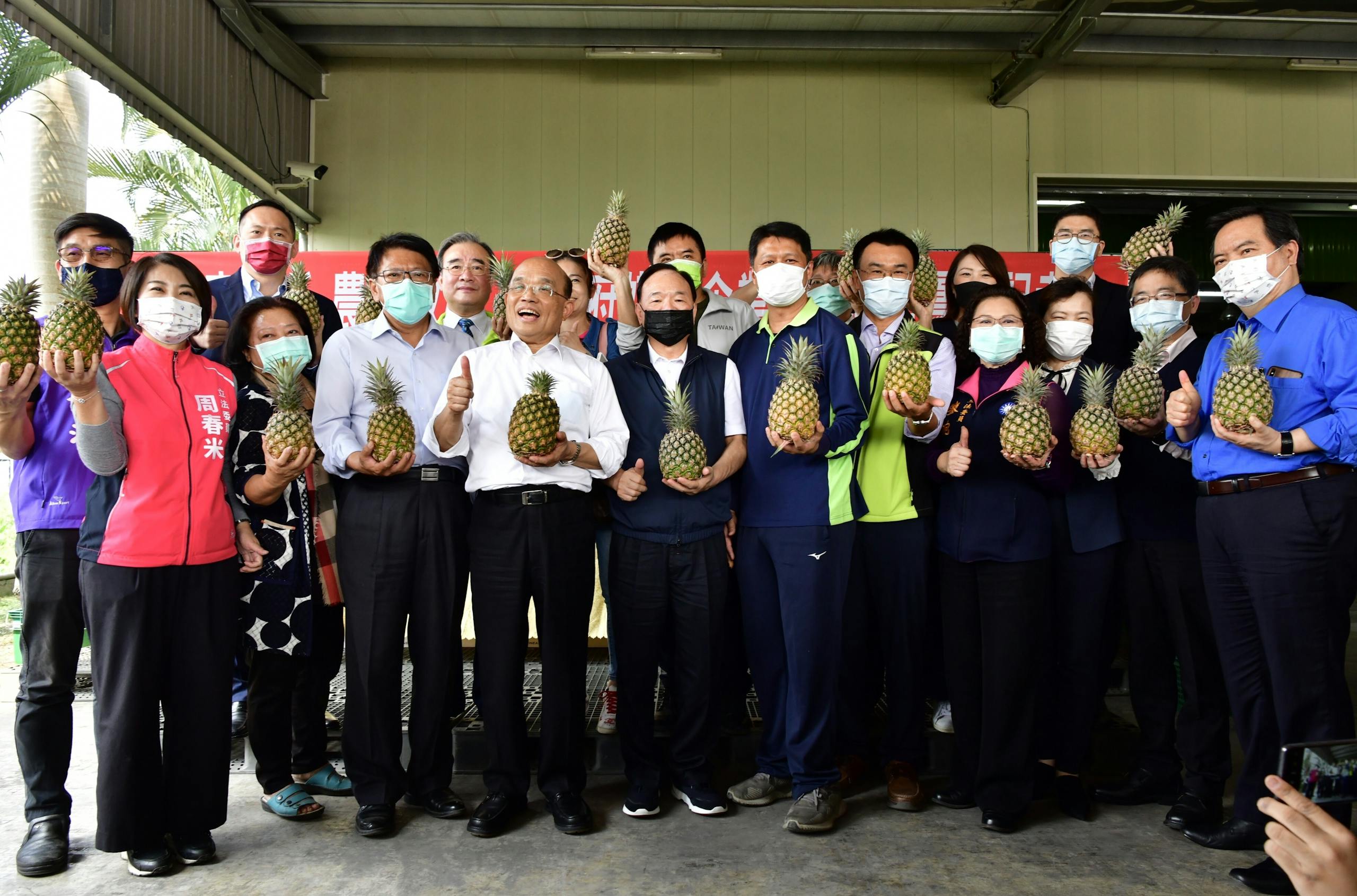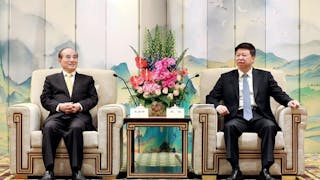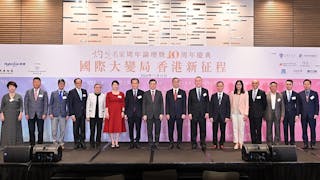2021年3月1日,大陸停止進口台灣菠蘿(鳯梨),理由是檢疫發現害蟲。另外,大陸又在3月17日提出「關於支持台灣同胞台資企業在大陸農業林業領域發展的若干措施」(簡稱「農林22條措施」)。從單方面停止台灣菠蘿入口,到對台灣投資大陸農林業採取懷柔措施,顯示大陸停止進口台灣菠蘿,已引起台灣當局的反應。
變相激起台灣本土主義
從2005年到2019年,兩岸農產品貿易發展迅速。2005年8月1日,大陸對包括椰子、菠蘿和芒果在內的全部台灣水果實施了「零關稅」政策;2006年4月,大陸政府在首屆兩岸經貿論壇上宣布擴大零關稅政策;2010年6月,兩岸簽署了《海峽兩岸經濟合作框架協議》(ECFA),其中包括大陸對台灣18種農產品提供零關稅的特殊待遇;2019年3月,國民黨高雄市前市長韓國瑜訪問香港、澳門和內地,簽署了幾項台灣農產品交易的協議。但是,中國海關總署在2021年3月宣布,由於檢疫發現有害生物,自2021年3月1日起,停止進口台灣菠蘿。
然而,這一措施卻給一些台灣政客提供了千載難逢的機會,他們以本土主義的方式來推銷台灣菠蘿。台灣行政院長蘇貞昌宣布將成立「農產品國家隊」,呼籲民眾買菠蘿,並補貼農民將鳯梨出口到澳洲和日本等國家;台灣教育部鼓勵學校「將鳯梨加入營養午餐」;台灣軍方也計劃在午餐和晚餐推廣鳯梨。大陸停止進口台灣菠蘿刺激了台灣島內本土主義的情緒高漲。
台灣向大陸出口菠蘿的全盛期出現在2018年和2019年,當時一些台灣農民前往海南省種植菠蘿。 但據報道,海南種植的菠蘿種類與台灣的完全不同。一些台灣農民批評對岸出於「政治原因」停止進口台灣菠蘿,他們說,大陸向台灣出口了很多啤酒,其中包括青島啤酒和百威啤酒,突然禁止進口台灣菠蘿是將經濟和政治混為一談。 一些台灣農民抱怨說,如果鳯梨確實有害蟲,那麼大陸農業主管部門應該在技術和程序上解決這個問題,而不是突然停止進口台灣鳯梨。
兩岸關係重要晴雨表
客觀地說,台灣農業部也應該更好地為農產品出口各地把關。 3月初,一家日本貿易公司Wismettac發現台灣香蕉中的農藥含量超過了規定標準的5倍,不得不從市場上回收和銷毀台灣香蕉。台灣農業部官員則解釋,一個裝有750箱香蕉的貨櫃農藥含量過高,其他出口到日本的香蕉則通過了農藥含量測試。
然而,台灣一些網民嘲笑執政民進黨,說政府應該更仔細、更徹底地檢查出口產品,而不是把責任推卸給出口的市場。有網民說,對於日本銷毁香蕉,台灣的克制似乎表現出「雙重標準」,意思就是說台灣當局抓住了大陸停止進口菠蘿大做文章,卻對日本的行動保持緘默。
3月17日,大陸當局提出22條措施,以支持台灣同胞和台資企業在大陸發展農業和林業。根據這些措施,台灣同胞在大陸農業和林業投資可以申請農業保險、補貼、貸款和信貸擔保,以及發行債券和證券來積累資本。據報道,福建的一些台商表示擁護和支持這些新措施,對他們來說,可以增強他們對大陸投資的信心。
無論如何,大陸對台灣菠蘿的禁令,不僅說明了台灣海峽兩岸的農業政治,而且還刺激了台灣本土主義及其對大陸政策的消極反應。然而,大陸迅速改變了強硬的政策禁令,改為採取較溫和的方式來吸引台灣同胞投資大陸的農業和林業。這一政策轉變表明,大陸仍然渴望以懷柔的方式與台灣同胞打交道,修補3月1日禁令造成的損失。因此,在未來幾年中,農業政治很可能仍是兩岸關係的重要晴雨表。
Cross-Straits Pineapple and Agricultural Politics
The termination of the import of Taiwan pineapples by the government of the People’s Republic of China (PRC) on March 1, 2021 on the grounds that they were infected with pests and the ensuing publication of twenty-two stipulations on agriculture and forestry on March 17 have showed a fluctuation from hardline policy toward pineapples to softline approach to dealing with Taiwan’s agricultural investment in mainland China. This policy oscillation has demonstrated the mainland’s remedial work on its ban on the import of Taiwan pineapples on March 1, while at the same time triggering kneejerk responses from the Taiwan government and its ruling party.
From 2005 to 2019, cross-straits agricultural trade developed rapidly. On August 1, the PRC government implemented a zero-tariff policy toward a whole range of Taiwan fruits, including coconuts, pineapples and mangoes. In April 2006, the PRC government during the first trade forum held between the Chinese Communist Party (CCP) and Kuomintang (KMT) announced that the zero-tariff policy was extended to cover shrimps, bitter gourd, cauliflower and fish. In June 2010, both sides of the two governments signed the Cross-Straits Economic Cooperation Framework Agreement (ECFA), which included the mainland’s privileged treatment of offering zero tariffs to eighteen agricultural products to Taiwan. These products embraced bananas, tea and fish. In March 2019, the former Kaohsiung city mayor Han Kuo-yu of the KMT visited Hong Kong, Macau and the mainland, signing several agreements on the transactions of agricultural products for Taiwan. In March 2021, however, the PRC’s customs and excise authorities announced that, due to the presence of pests, Taiwan’s pineapples would be barred from entering the mainland Chinese soil starting from March 1.
However, such a move immediately provided a golden opportunity for many local Taiwan politicians to argue for a nationalistic approach to promoting pineapples. The Taiwan Executive Yuan announced the establishment of a task force on agricultural products to appeal to the members of the public to buy pineapples, and to subsidize pineapple farmers to sell their products to other places such as Australia and Japan. The Taiwan educational authorities encouraged schools to incorporate pineapples into the lunch menus of school children. The Taiwan Defense Ministry announced a package of assisting the Agriculture Ministry to promote pineapples to the lunch and dinner of military personnel. Suddenly, the PRC ban on the import of Taiwan pineapples stimulated a rise in Taiwan nationalism.
The apex of Taiwan’s export of pineapples to the mainland took place in 2018 and 2019, when some Taiwan farmers went to Hainan province to grow pineapples. However, the types of pineapples produced in Hainan were reportedly quite different from those produced in Taiwan. Some Taiwan pineapple farmers criticized the PRC ban on the import of pineapples for “political reasons,” a policy change that would change the farmers’ support of the Democratic Progressive Party (DPP) in Chiayi, Kaohsiung, Tainan and Pingtung. They said that the PRC exported a lot of beer to Taiwan, including Tsingtao and Bai Wei beer, and that the sudden ban on the import of Taiwan pineapples mixed up economics with politics. Some angry Taiwan farmers complained that if Taiwan pineapples really had pests, then the PRC agricultural authorities should have handled the issue more technically and procedurally rather than adopting an abrupt ban on imports.
Interestingly, some Taiwan politicians argued that it was better to export pineapples to Japan rather than to the PRC. In 2021, the export of Taiwan pineapples to Japan is expected to reach 6,000 tons, a figure representing a significant increase from 2,144 tons in 2020. Hence, some Taiwan critics of the mainland agricultural policy said that the sudden ban has triggered a closer relationship in Japan-Taiwan agricultural trade. Traditionally, Taiwan has been depending on the mainland market for its export of fruits, amounting to NT$1.51 billion out of the total pineapple export of NT$1.68 billion in 2020 alone.
Objectively speaking, the Taiwan agricultural ministry needs to play a more efficient and effective role in being the gatekeeper of the export of agricultural products to various places, including pineapples to the PRC and bananas to Japan. In early March, a Japanese trade company, Wismettac, found that the amount of pesticide in Taiwan’s bananas exceeded fivefold from the required standard, and it had to recollect and destroyed the Taiwan bananas from the market. The Taiwan agricultural officials explained that one container which included 750 boxes of bananas was found to have excessive pesticide level, and that other bananas exported to Japan passed the pesticide level tests. Yet, some netizens in Taiwan ridiculed the ruling DPP, saying that the government should have inspected its products for export more carefully and thoroughly instead of putting the blame on any export targets. Other netizens said that the Taiwan’s restraint on the Japanese action appeared to show “double standard,” meaning that the Taiwan authorities seized the PRC ban on pineapple imports to criticize the mainland while remaining silent on Japan’s action.
Domestically, Taiwan’s KMT criticized the ruling DPP for its mismanagement in agricultural policy, because in 2019 the government spent NT$ 3.23 billion for buying agricultural products for the purpose of making fertilizers – a huge amount out of a total of NT$6.59 billion for a plan to boost the state procurement of agricultural products. Critics said that agricultural products in Taiwan lacked sufficient outside markets and that the PRC should be the main target of exports. For some KMT politicians, establishing a better relationship with the PRC could have helped the export of Taiwan’s agricultural products rather than relying on the Taiwan state to buy back much of them to produce fertilizers, thereby “wasting the taxpayers’ money.” Due to the reluctance of the DPP government to recognize the 1992 consensus, the tense Beijing-Taipei relations remain the ultimate obstacle for Taiwan’s agricultural products to penetrate into the mainland market.
On March 17, the PRC government publicized twenty-two stipulations to support the Taiwan comrades and investors to develop agricultural products and forestry in the mainland. The Taiwan comrades can enjoy the same privileges as with the mainlanders in investing in the PRC to grow agricultural products, to engage in innovative research, and to expand their markets in the mainland. They are welcome to manage farmland and forestry, make investment and accumulate capital. The stipulations also welcome the Taiwan investors to participate in the production of heavy agricultural machinery, fishing facilities, smart agriculture, green products, ecological tourism, forest protection and the growing of special agricultural products and forestry. The Taiwan comrades who invest in the mainland farmland and forestry will be, according to the twenty-two stipulations, given the privilege of continuing with their business and rental agreement. They can apply for agricultural insurance, subsidies, loans and credit guarantees as well as the issuance of credit-type bonds and securities to accumulate capital. Some Taiwan businesspeople in Fujian were reportedly embracing and supporting these new policy measures, which to them can boost their confidence in business investment in the mainland.
Moreover, the PRC’s Taiwan Affairs Office clarified that the mainland side had reported 28 times to the Taiwan authorities on the pest-infected pineapples, but there was no response from the Taiwan side (Ta Kung Pao, March 18, 2021, p. A11). It seemed that the Taiwan agricultural authorities responded slowly to the complaints from their mainland counterparts.
Some Taiwan critics of the PRC’s twenty-two stipulations said that the mainland side conducted united front work on the Taiwan farmers and investors, and that the Taiwan investors had encountered many unresolved problems in the mainland, such as the sudden termination of electricity supply, and the need for some Taiwan investors to pay bribes to some corrupt cades who harassed the Taiwan comrades in the name of tax inspection (Liberty Times, March 18, 2021).
Regardless of the criticisms from the Taiwan side, the change from the policy ban on the import of Taiwan pineapples to the swift announcement of twenty-two stipulations for Taiwan farmers and investors in the agricultural industry showed goodwill gesture from the mainland side.
In conclusion, the PRC ban on Taiwan pineapples has not only illustrated agricultural politics on both side of the Taiwan Strait but also stimulated Taiwan’s nationalism and its negative response to the mainland policy. However, the PRC side swiftly changed its hardline policy ban to a more softline approach to embracing Taiwan comrades to invest in the mainland farmland and forestry industry. This policy shift has proved that mainland China remains eager to deal with the Taiwan comrades in a soft manner, repairing the damage done shortly after the March 1 ban. As such, agricultural politics will likely remain a crucial barometer of Beijing-Taipei in the coming years.
原刊於澳門新聞通訊社(MNA)網站,本社獲作者授權轉載。







































